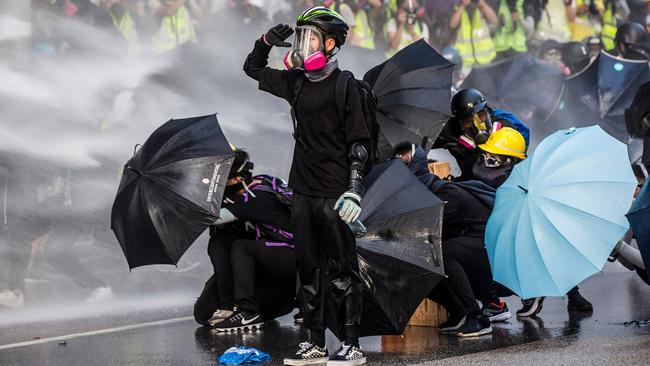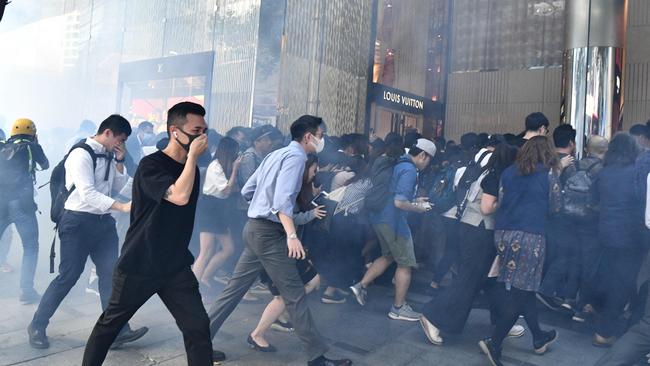Hong Kong unrest boosting Sydney house prices: Credit Suisse
New surge in Sydney home prices appears driven by Chinese demand and money from Hong Kong.

What may be the start of another boom in Sydney house prices appears to have been driven by continued strong demand from China and heavy outflows from Hong Kong amid worsening civil unrest there, according to analysis by Credit Suisse Australia.
Whereas domestic demand and supply factors can’t fully explain the recent 22 per cent quarter-annualised growth rate in Sydney house prices, surging Chinese buyer inquires can, says Credit Suisse strategist Damien Boey.
In the year to September, buyer inquiries registered on China’s largest real estate portal – juwai.com - rose by 37.3 per cent for Australia and almost 90 per cent in Sydney alone.
At the same time, Hong Kong buying interest in Australian residential property has surged by around 50 per cent since civil unrest over China extradition law escalated in June this year.
READ MORE: House prices in biggest surge since May 2015 | Beijing edges closer to Hong Kong action | Australia needs a plan to deal with Hong Kong fallout | Hong Kong property trickle to become a flood
A proprietary capital flows measure used by Credit Suisse has registered large outflows from the Chinese territory.
“Our model of house prices based on home sales, net new buyer - investor and first homebuyer - participation, and supply from new construction and foreclosures, registers an improvement in the housing demand-to-supply balance, but not to levels consistent with an outright shortage in the market, and rising prices,” Mr Boey says. “Our model error as it were, is currently at all-time highs.”
Perhaps counterintuitively, Mr Boey finds that large investment inflows into Hong Kong have correlated with outsized gains in Sydney house prices in the past.
“Essentially, history is telling us that when global credit creation has been strong, more money has flowed into emerging market gateways like Hong Kong, with ‘crowding in’ effects,” he says.
“Central bankers have chosen to accommodate capital inflow through deposit and reserve expansion, rather than exchange rate appreciation, and the resulting excess liquidity has helped to fuel local credit and economic growth, as well as asset price inflation.
“As residents have grown in wealth and income, they have been able to export more capital abroad, supporting foreign property markets, like Sydney.”
But now he’s seeing “a very large structural break in the relationship” and “investors are behaving as if something has permanently changed in Hong Kong, and for the worst.”
“China and Hong Kong uncertainty has spiked to historically high levels, expatriates and wealthy locals are choosing to head for the exits,” he says.
“Outsized capital outflows are having a large inflationary effect on property markets abroad, even though the global credit and liquidity signals they send would ordinarily be quite deflationary.”
But while Sydney house prices are “benefiting from one-time Hong Kong flows”, Mr Boey expects that as valuations rise and the flow from Hong Kong matures, returns will fall in the longer term.
“The key issue is whether world credit and liquidity conditions tighten significantly from here to make the outflow signal from Hong Kong genuinely worrisome from a global, rather than just local, perspective,” he says.
“Arguably, the signal is already worrisome, because of the backdrop of US-China trade and technology disputes. The ‘elephant in the room’ is that the manner in which authorities choose to deal with Hong Kong protests could shape the way the broader US-China negotiations go.
“Should the situation in Hong Kong really deteriorate, and should Chinese and Hong Kong authorities deal with matters in a manner perceived as being ‘excessive’ by Western norms, it is possible that the US will become less willing to deal with Chinese officials, escalating the trade war.”

If the trade war was to escalate again, Mr Boey warned that US dollar liquidity conditions in offshore markets could “deteriorate materially”.
But if not, there may be another leg up in the housing market as global uncertainty emanating from China and Hong Kong spurs capital flight into property markets like Sydney.
“The irony is that this very same uncertainty in highly-leveraged times is causing Australian households to hold off on spending and borrowing,” Mr Boey notes.
Despite three interest rate cuts from the Reserve Bank, macro-prudential easing and prospective first home-buying incentives, investor interest in the housing market has gone backwards, first home-buying interest has lifted only moderately, and credit growth has remained sluggish as households haven chosen to pay off debt.
“Fortunately, foreigners are saving the day now,” Mr Boey says.
He argues that with more policy easing expected in Australia and progress on US-China trade talks anticipated next month, uncertainty among prospective local home buyers may dissipate, leading them to “start to participate more in the housing market recovery.”
In that scenario, construction activity and credit growth could bottom out early as property developers respond to a genuine recovery in foreign buying interest, driving house prices higher.
“Historically, house price inflation has corresponded with building approval levels above completion levels (but) this cycle has been a little different, and we suspect that we are seeing more of a delay than a decoupling,” Mr Boey says.
“We think that building approvals could bottom out well ahead of time, supporting earnings upgrades for the building sector over the next year from a very low base.
“We also think that as locals regain the courage to participate in the housing market recovery, credit growth will pick up, supporting the earnings of banks and domestic cyclicals more broadly.”
In his view, improvement in earnings momentum for many “cheap” domestically-exposed companies could help to sustain the recent value style recovery for a bit longer.
The main risk to a generally positive view is that global liquidity conditions dry up before local housing investors take up the baton of growth, Mr Boey says.





To join the conversation, please log in. Don't have an account? Register
Join the conversation, you are commenting as Logout